- Home
- Sherman Alexie
Flight Page 12
Flight Read online
Page 12
“This is where you and Justice lived?” Eyeglasses asks me.
“Yeah.”
“Well, if he was here, he’s gone now.”
“Yeah.”
I know that I won’t see Justice again.
Eyeglasses stares at me hard. He’s good at staring hard.
“Zits,” he says. “I’m happy you changed your mind about using those guns.”
I’m happy, too, but I can’t say that.
Later, as I sit in a holding cell, waiting for a transfer to yet another halfway house or juvie hall or real prison, Officer Dave visits me.
He leans against the bars of my cell.
“You’re going to die,” he says.
I’m trying to be as tough as I used to be, but it’s not working. I feel like a carton of eggs holding up an elephant.
“You are going to die,” Dave says again. He says each syllable like it was a cussword. Or a prayer.
“So I’m going to die,” I say. “What does it matter? I don’t matter. I’m nothing.”
“Zits,” he says. “You matter. Everybody matters. You matter to me.”
“You’re a cop,” I say. “You don’t care about anything.”
“I care too much, man,” Dave says.
I look at him. Tears are rolling down his big cop face. Who knew that cops could cry?
“What’s wrong with you?” I ask.
Dave wipes his face. He’s embarrassed by his tears. But he has something important to say, so he says it.
“A few weeks ago, we got this nine-one-one call,” he tells me. “A man said there was this crazy screaming in the house next door. Like babies just crying and crying, louder than he ever heard before.”
Dave looks at the ceiling as if his memory was playing like a movie up there. I look up and see it, too.
I can’t jump into Dave’s body but I can feel and see and understand a little bit about his pain, I guess.
In their squad car, Dave and his partner pull up in front of a house. A small, dirty house. Garbage on the lawn. Two broken cars in the driveway.
The cops knock on the front door.
No answer.
They knock.
No answer.
Dave puts his ear to the door.
“Can you hear that?” he asks.
“What is it?” his partner asks.
“It sounds like water running.”
Dave steps down on the lawn and peers through the front window. Through a crack in the curtains, he can see two people lying on the floor.
“Two people down, two people down,” he says.
Dave and his partner draw their guns and burst through the front door.
Two people lying on the living room floor. A man and a woman. Dead.
No, alive: passed out.
Beer bottles, wine bottles, vodka bottles, crack pipes, the stink of meth.
“Jesus, I hate that smell,” the partner says. He kicks the man. “Wake up,” he says.
The man doesn’t move. Just breathes heavy.
He kicks the man again. Harder. “Wake the fuck up,” he says.
The man just lies there.
“I hate these freaks,” the partner says.
But Dave is already moving into another room. He’s following that sound: running water. He steps into a pool of water in the hallway.
Cold water. Where’s it coming from? The bathroom at the end of the hallway.
“We got something going on here,” Dave says to his partner.
Together, they walk down the hallway. Through the water. Getting deeper. Flooding the house.
They reach the bathroom door.
With head nods and hand signals, they talk to each other.
Are you ready to go in?
Yes.
Okay, on three.
One, two, three.
Dave turns the knob and pushes against the door.
It’s locked.
No, it’s just stuck. A difficult door. Dave pushes hard. The door screeches open.
And they see two toddlers, a boy and a girl, two or three years old, lying still on the floor.
Covered with burns: their legs, their backs, their bellies.
Hot-water scalds.
The tub faucet pours out water. Overfills the tub. Floods the room.
It’s cold water now. Ice cold. But it was boiling hot when it overflowed the tub, when the two babies were trapped by the difficult door, when they screamed so loud that the neighbor could hear them, but not so loud that it woke their parents from their drunken stoned slumber.
“Oh, my God! Oh…my…God!” Dave shouts. “Get an ambulance here, now, now, now!”
Dave’s partner calls for help.
Dave kneels down in the water and picks up the babies, one in each arm. Their eyes are open and blue and blind. They’re gone.
Dave cries.
He wants to go back in time. He only needs to travel back an hour—just one hour—and he’ll be able to save these kids. He’ll take them away from their terrible parents, from this terrible life, and he’ll love them. He’ll keep them safe.
“They were just babies,” Dave says to me. “Helpless little babies. I couldn’t save them. I was too late.”
I don’t know what to say.
Dave weeps. I weep with him.
He leans against the bars of my cell. I don’t know if I’m the one in jail, or if he is.
Twenty-one
AFTER MONTHS OF COUNSELING, social work, mental therapy, and absolute boredom, the medical professionals and social workers and cops decide that I am not going to kill anybody. I am not dangerous.
Really, that’s what they say to me: “Zits, we don’t think you’re dangerous.”
How am I supposed to respond to something like that?
“Oh, uh, thank you, ma’am.”
I mean, jeez, I’m a fifteen-year-old foster kid with a history of fire setting, time traveling, body shifting, and mass-murder contemplation. I think I’m a lot more than just dangerous.
I think I might be unlovable.
But as dangerous and unlovable as I am, the state places me in a temporary foster home.
With Officer Dave’s brother and sister-in-law.
“They don’t have any kids,” Officer Dave says. “But they always wanted a baby.”
I don’t think I exactly qualify as a bouncing baby boy, but who am I to complain?
“Is your brother a cop?” I ask.
“He’s a fireman,” Dave says. “My other brother works for the post office.”
“Jesus,” I say. “You guys are like the civil servant hall of fame or something.”
Dave laughs. I always could make him laugh. I hope I can make his brother laugh.
Man, I can’t believe that a firefighter is going to be my new foster father, but it does make some kind of metaphorical sense, doesn’t it?
I guess they really want me to be under close supervision. Well, I’m happy it’s only going to be temporary. I’ll go crazy living with a firefighter. They always walk around looking for smoke.
I want to ask Dave why he’s sending me to his brother. Why doesn’t Dave just take care of me by himself? I think I know the answer. I think he’s scared of disappointing me.
The social workers deliver me to the firefighter’s house in the middle of the night, like some sort of major-league prisoner or something. They don’t have me in handcuffs, but I feel handcuffed, if you know what I mean.
They put me in this little bedroom. And I lie there in the dark and wonder if I can fall asleep in a strange bed. But I fall asleep while worrying that I might not fall asleep.
The alarm clock wakes me up at 7 A.M. It plays Blood, Sweat & Tears. Really.
That song called “I Love You More Than You Will Ever Know.” The one my mother used to sing to me.
It makes me want to gag. How cruel is this? I’m living in a firefighter’s house and the alarm plays my mother’s favorite song.
I turn off the music, go
into the bathroom, and pee for two minutes.
Then I walk out into the kitchen.
Officer Dave is eating breakfast with his brother and sister-in-law: oatmeal and fruit and sausage. It smells great. Dave and the firefighter are wearing their uniforms. The wife is wearing a nurse’s uniform. And she’s kind of hot, you know. She’s really tall and has long brown hair and brown eyes. Her cheekbones are big, too, like Indian cheekbones. I wonder if she’s a little bit Indian. She smells pretty great, too. She smells even better than the oatmeal, fruit, and sausage.
“Good morning,” she says to me. “Do you want some oatmeal?”
“Whatever,” I say, and sit down.
The firefighter looks at me. He’s not reading a newspaper. He’s not ignoring me. He looks right at me.
“My name is Robert,” he says and offers his hand. I take it. We shake like gentlemen.
Officer Dave stares at me, too. I think he’s thinking about those two babies in the bathroom. I wonder if he’ll always look at me and see those two babies in the bathroom. I hope not. I hope someday he looks at me and just sees me.
“Hey, Zits,” he says. “After work today, I’m thinking all of us men should go to the Mariners game. What do you think?”
I want to say Whatever, but it doesn’t come out that way. I realize that Dave isn’t leaving me to his brother. Dave is going to take care of me, too. That makes sense, I suppose. I need as many fathers as possible.
“You ever been to a baseball game?” Robert asks me.
“I’ve never seen one in person,” I say.
A baseball game! Jesus, how American. Next thing you know, Dave and the firefighter and I will be playing catch in the backyard.
“Well, I got some tickets,” Dave says.
“They’re shitty seats,” Robert says. “My brother is a cheap-ass bastard. We’re going to be way up in the sky. Behind home plate. But they’re fun anyway. We’ll watch the game and eat hot dogs and drink lemonade. How does that sound?”
Before I can answer, his wife speaks up.
“You will not eat junk,” she says. “I’ll pack you some fruits and vegetables. And you’ll drink water. Lots of water.”
She smiles at me. Her teeth are the brightest teeth in the world. Every one of those teeth is a statue of somebody beautiful.
“My name is Mary,” she says. “I’m happy you’re here with us.”
“It’s only temporary,” I say.
“Well, Robert and I are hoping to make it permanent,” she says. “How does that sound to you?”
For a second, I can’t even remember what that word means. For a moment, I forget that the word permanent ever existed.
“Wow,” I say. “Permanent might be pretty cool.”
I look at Dave. He’s smiling. How often do cops smile? Not very much, I guess, because Dave’s smile is goofy and big. If he knew how goofy and big it was, he’d practice more.
He’s trying to save me. And he’s smiling about it. I guess that’s okay. Maybe I can save him, too.
“Okay, kid,” he says. “We got to go. I’ll see you back here after work.”
Robert kisses Mary and leaves. Dave tousles my hair and leaves. Yes, he tousles my hair. No father has tousled a kid’s hair since 1955. I wonder if I have dropped into some weird time-travel thing again. But no, Dave is just a decent guy. Wow.
So I’m here alone with Mary. I’m in love.
Is it okay to be in love with your foster mother? Well, to be honest, I don’t care if it’s okay or not.
“All right,” she says. “After breakfast, I’m going to take you down to the new school and get you enrolled. And then I’m going to work for a few hours. And then I’ll come back and pick you up after, okay?”
She’s giving me a schedule.
“What time will you pick me up?” I ask.
“Well,” she says. “School gets out at two-thirty. So I’ll meet you in front about two-forty-five. How does that sound?”
“Are you really going to be there?” I ask.
She smiles, but there’s a little sadness in her eyes, too. She knows I’ve been lied to a million times.
“I’ll be there,” she says. “I promise.”
Promise. What a good word. What a hopeful word.
“Whatever,” I say, because it hurts to have hope.
“Hey, listen,” she says, and leans down close to me. Her face is three inches from mine. She looks right into my eyes. “When I make promises, I keep them. Do you understand?”
“Yes,” I say.
“Do you believe me?”
“Yes,” I say. And you know what’s weird? I do believe her.
“All right, then,” she says. “Finish your breakfast.”
So I eat until my belly is stuffed and then I go into my bathroom to get ready.
I have my own bathroom!
Pretty soon there’s a knock on the door.
“Yes,” I say.
“Can I come in?” she asks.
“Yeah, I’m decent,” I say, and laugh. I’ve never been decent, not once. And I’ve never used that word before. I’m getting soft.
Mary comes in. She looks a little nervous. She’s carrying a bag of stuff.
“Is there something wrong?” I ask.
“No,” she says. “It’s just—well, this is difficult. But can I say something really personal to you?”
“Okay, I guess.”
“Well, it’s about your face.”
“I know. I’m ugly.”
“No, you’re not ugly. You’re handsome, actually. But your skin—we need to start working on your skin. You’ll be a lot happier if we do.”
She reaches into the bag and pulls out three jars and sets them on the sink.
“Okay,” she says. “This is some skin-care treatment stuff, okay? I’m going to teach you how to use it, okay?”
“Okay,” I say.
“Well, first of all, you need to wash your face with this stuff. It’s an acne scrub. It will clean your pores and get rid of the old dead skin, okay?”
“Okay,” I say, and wash my face.
“Good, good,” she says. “Then we use this stuff to put right on your pimples. This goes after the bacteria in there. So just put a little on your fingertip and dab it on the big zits, okay?”
That takes me awhile. I have a lot of zits.
“Okay, good,” she says. “Now this last stuff, it’s an all-over moisturizer and oil-reducing cream. It’s funny, but it will keep your skin moist but dry at the same time.”
“I don’t get it,” I say.
“I don’t either,” she says, “but it works, okay? Trust me.”
I rub that stuff all over my face.
“There, that’s good,” she says. “We do this twice a day, and your face should start clearing up in a week or two. A few months from now, you’ll be brand-new.”
That just gets me in the soul. Right there, I start to cry. Really. I just weep and wail.
Mary hugs me. She hugs me tightly. It feels great. I haven’t been hugged like that since my mother died.
I’m happy.
I’m scared, too. I mean, I know the world is still a cold and cruel place.
I know that people will always go to war against each other.
I know that children will always be targets.
I know that people will always betray each other.
I know that I am a betrayer.
But I’m beginning to think I’ve been given a chance. I’m beginning to think I might get unlonely. I’m beginning to think I might have an almost real family.
“I’m sorry, I’m sorry, I’m sorry,” I keep saying.
“It’s okay,” she says. “You’ll be okay.”
“Michael,” I say. “My real name is Michael. Please, call me Michael.”
Acknowledgments
I OWE SPECIAL THANKS to Nancy Stauffer, for her continuing grace and friendship; to Morgan, Elisabeth, Deb, Eric, and everybody else at Grove, who were there in
the beginning and are still with me in the middle; to Christy Cox, who keeps order in my insane life; and to my mother and siblings, who let me write about them and don’t complain publicly.
All rights reserved, including without limitation the right to reproduce this ebook or any portion thereof in any form or by any means, whether electronic or mechanical, now known or hereinafter invented, without the express written permission of the publisher.
This is a work of fiction. Names, characters, places, events, and incidents either are the product of the author’s imagination or are used fictitiously. Any resemblance to actual persons, living or dead, businesses, companies, events, or locales is entirely coincidental.
Copyright © 2007 by Sherman Alexie
Cover design by Connie Gabbert
978-1-4804-5721-8
This edition published in 2013 by Open Road Integrated Media, Inc.
345 Hudson Street
New York, NY 10014
www.openroadmedia.com
EBOOKS BY SHERMAN ALEXIE
FROM OPEN ROAD MEDIA
Available wherever ebooks are sold
Open Road Integrated Media is a digital publisher and multimedia content company. Open Road creates connections between authors and their audiences by marketing its ebooks through a new proprietary online platform, which uses premium video content and social media.
Videos, Archival Documents, and New Releases
Sign up for the Open Road Media newsletter and get news delivered straight to your inbox.
Sign up now at
www.openroadmedia.com/newsletters
FIND OUT MORE AT
WWW.OPENROADMEDIA.COM
FOLLOW US:
@openroadmedia and
Facebook.com/OpenRoadMedia

 Blasphemy: New and Selected Stories
Blasphemy: New and Selected Stories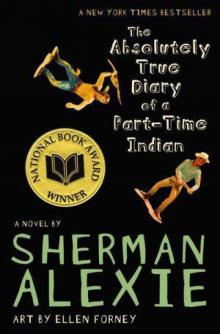 The Absolutely True Diary of a Part-Time Indian
The Absolutely True Diary of a Part-Time Indian Flight
Flight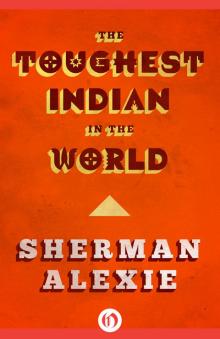 The Toughest Indian in the World: Stories
The Toughest Indian in the World: Stories Reservation Blues
Reservation Blues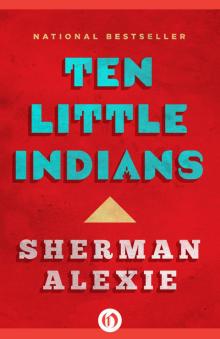 Ten Little Indians: Stories
Ten Little Indians: Stories Flight: A Novel
Flight: A Novel Blasphemy
Blasphemy The Lone Ranger and Tonto Fistfight in Heaven
The Lone Ranger and Tonto Fistfight in Heaven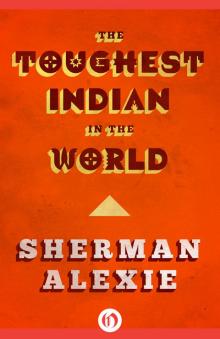 The Toughest Indian in the World
The Toughest Indian in the World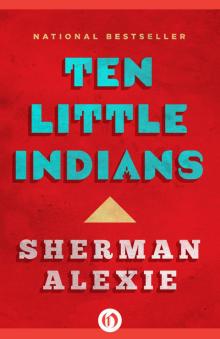 Ten Little Indians
Ten Little Indians